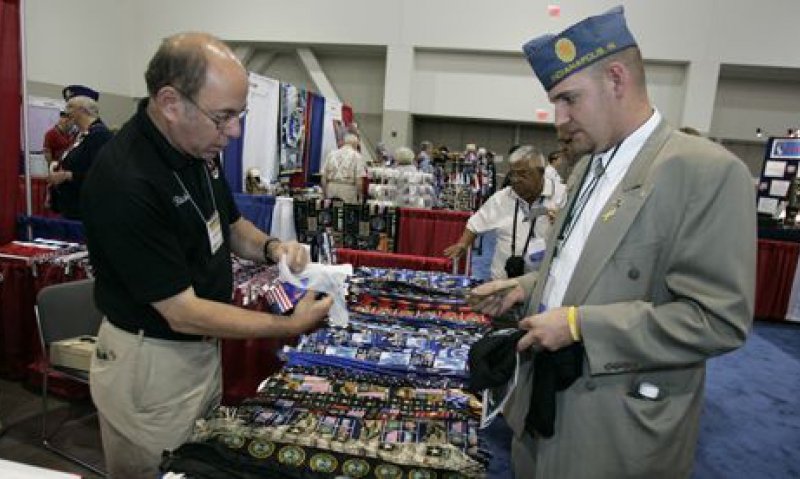
"Would I be worthy of their sacrifice?" That's the question Rebecca Pepin attempts to answer in her book "Faces of Freedom."
Dear Lord,
Lest I continue my complacent way, help me to remember that somewhere, somehow out there, a man died for me today. As long as there be war, I then must ask and answer: Am I worth dying for?
- A wartime prayer by Eleanor Roosevelt
‘Would I be worthy of their sacrifice?'
Rebecca Pepin is American by choice. The Virginia television news anchor became a U.S. citizen Oct. 27, 2006, in Abington, Va. She remains proud of her Canadian heritage, but she's even prouder of the men and women serving today in the global war on terrorism.
"At the swearing-in ceremony, Judge Michael F. Urbanski challenged the group of 15 new citizens before him to make a difference in our communities," Pepin says. "The judge urged us not to become complacent and to remember that we have an obligation that accompanies the honor of becoming an American."
The challenge stayed on Pepin's mind. And it became the genesis of her book, "Faces of Freedom: Profiles of America's Fallen Heroes - Iraq and Afghanistan." Its pages contain profiles and photographs of 52 U.S. servicemembers who paid the supreme sacrifice while answering their country's call to duty. "Judge Urbanski's words immediately reminded me of the men and women in the armed services," Pepin says. "I couldn't help but feel emotional as I considered the thousands of military members who were in faraway lands on that day instead of sharing special moments with their families. My thoughts were particularly with those who are serving in the current conflict in the Middle East. Would I be an American worthy of their sacrifice?"
Pepin's purpose in compiling "Faces of Freedom" was not to add to the world's literary collection of famous battles and military heroes. Her purpose, she says, is to shine light on a small sample of the ordinary military men and women who have died performing courageously in extraordinary circumstances. They are the kind of men and women, Pepin says, who too often "barely get a mention in their local newspapers."
Army Spc. Kendell Frederick of Randallstown, Md., was such a soldier. When the 17-year-old from Trinidad told his mother four years ago he wanted to enlist in the U.S. Army, she had mixed emotions. He belonged to Junior ROTC, so she wasn't completely caught off guard. She also knew he dreamed of becoming a U.S. citizen.
A generator mechanic for his unit in Iraq, Frederick was close to realizing his dream on Oct. 19, 2005, when he departed in a convoy to get fingerprinted in order to process his citizenship application. En route, the convoy hit a roadside bomb. The young soldier had tried for more than a year to become a U.S. citizen, but his application was delayed several times. He was granted citizenship a week after he died.
"My son loved what he was doing," Frederick's mother says. "He so much wanted to become an American citizen. Paperwork mix-ups delayed his efforts before he left for Iraq, but he was trying to become a U.S. citizen until the day he died. We all are so proud of him."
Following the soldier's death, Sen. Barbara A. Mikulski, D-Md., introduced the Kendell Frederick Assistance to Citizenship Act to help prevent such tragedies. Thanks to her legislation, a telephone help line - (877) 247-4645 - was established for use both inside the United States and overseas. It is available for U.S. servicemembers and their families, with expedited service for soldiers set to deploy or for families applying for citizenship posthumously.
Kendell Frederick's story is one of 52 told in Pepin's book. The portraits reflect a "rich diversity from all walks of life, every race and creed," writes retired Maj. Gen. Thomas M. Sadler in the book's afterword. "Some were experienced combat veterans, others fresh out of training. All were warriors who willingly faced enemy combat for the good of our nation, laying down their lives in the supreme act of devotion to their countrymen."
Pepin calls them quiet heroes.
"From time to time, we see or hear President Bush extolling the courageous sacrifices made by military men and women when bestowing high honors to grieving families," she says. "These warriors deserve recognition from a grateful nation. But so, too, do those whose individual sacrifice goes for the most part unnoticed except by family and friends.
"These men and women are not just numbers. They were our friends and neighbors, and the loved ones of our fellow Americans. While only 52 fallen heroes are featured in the book, it is a tribute to all who have made the ultimate sacrifice so that we - and our future generations - may live in peace, security and freedom."
James V. Carroll is an assistant editor at The American Legion Magazine.
- Magazine

